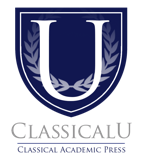
“Latin, for Its Own Sake” by Jacob Andrews
As a teacher of both Latin and philosophy, I am constantly fielding questions to the effect of, “Given that literature (or philosophy) is seen as a useless subject, how do you get students engaged with it?” To which the most common response I hear from other teachers is, “Oh, but it is useful! Here, have some statistics and anecdotes.” But that answer is either wrong or dangerously incomplete. Here’s how I would answer the question for Latin; it applies to philosophy and many other subjects as well.
I’ll start with a radical claim, then qualify it twice. Here’s the radical claim: Learning Latin is not useful.
Here’s the first qualification: Knowing Latin is useful, but learning Latin is not. I talk with students and parents about the ways knowing Latin is useful, but I try never to leave the impression that I teach Latin because of its usefulness. That’s a crucial distinction. If you already have learned Latin, it’s very useful for understanding English vocabulary, learning modern Romance languages, etc. But is the effort required to learn Latin worth the purely utilitarian benefits conferred? Not in the 21st century. If you want to know legal terminology, get a legal dictionary. If you want to learn Spanish, learn Spanish. There’s no reason why a law student needs to know the subjunctive mood or why a Spanish student must be familiar with the third declension. That’s what I mean when I say that learning Latin isn’t useful: it confers utilitarian benefits, but in a highly inefficient way, yielding a net negative utility. It’s productive, but not profitable.
Here’s the second qualification: Learning Latin is not useful, and that’s the point. I teach Latin not for its utility, but because the language is sonically beautiful, because its grammatical structure is fascinating, and because reading a classical language without translation allows you to enter the minds and hearts of men and women long dead in a way that is impossible in a history or literature class conducted in English. None of that is useful; or even if it is, that still isn’t the point, because the most important things in life are useless — for the simple reason that useful things by definition get their value from outside themselves, and therefore whatever is wholly intrinsically valuable is useless. And one of the greatest of the great and useless things is the life of the mind, of discovering truths and holding them in your heart for their own sake.
But can you imagine telling a twelve year old all that? Would they go home and work out a plan to turn themselves into preteen Aristotles? No way. It’s something that has to be caught, not taught. In the philosophical terms of Rome’s great Asian sister, it’s a matter of 無爲 (wuwei, indirect action), rather than 爲 (wei, deliberate effort). I can’t tell my students, “Cultivate life of the mind!” What I can do is lead by example, and what better way to do that than teaching them a useless, dead, beautiful language? That way, they get to see my own love for the life of the mind, for its own sake, and they get a chance to develop that love for themselves by learning Latin.
Maybe Latin isn’t their intellectual love. That’s fine. But it’s mine, and they can learn from my example and apply it to another fields. Anyway, they won’t know whether they love Latin until they’ve spent time with it (I took me about five years!). I tell my students that they don’t have to fake a love of Latin, and their willingness to share their frustration with me leads to productive conversations. I also make it clear that I will hold them to high standards no matter what they think of Latin, and they typically rise to the challenge.
My conviction that Latin is not useful also makes me cautious of another road to engagement. Often teachers get students interested in “useless” subjects by filling their classes full of games and activities. I’m wary of that approach. There are teachers who excel at it, whom I admire and sometimes envy. But there’s a fine line between cooking vegetables so well that your kid realizes they are delicious, and hiding vegetables in fat, salt, and sugar — as if to admit that you don’t really like them, either. Some teachers know how to walk that line. I hope to learn someday.
All this applies to other subjects, too, including the “useful” ones. Utilitarian love confers no delight: if I love A merely because it is useful for B, then I won’t actually enjoy A. I’ll merely use it as a means to enjoying B. If we tell our students to learn math because it’s useful (which it is), what we’re actually telling them is that math is not enjoyable or delightful in itself. The same is true if we teach them, by our example, that math is merely a means to the games we play in class. We should show students how what they’re learning will be useful, and we should season their learning with fun; but the pole star around which all these stratagems orbit should be cultivating and modelling a love of the subject for its own sake.
This is an Altum essay.
Related Course Content:
Essential Latin
 Jacob Andrews earned a PhD in Philosophy from Loyola Univerisity in Chicago. He teaches Latin, Logic, and Philosophy at Covenant Classical School in Naperville, IL.
Jacob Andrews earned a PhD in Philosophy from Loyola Univerisity in Chicago. He teaches Latin, Logic, and Philosophy at Covenant Classical School in Naperville, IL.
Note: Contributors to Altum share their own thoughts and do not represent ClassicalU.com or Classical Academic Press. If you are interested in writing for Altum, please complete the form at the bottom of our landing page.








Responses